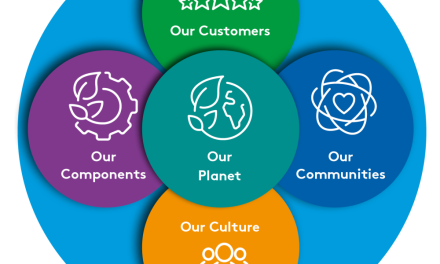Wastetech leader Topolytics has teamed up with the Centre of Engineering Education and Development (CeeD) to enable manufacturers throughout the UK to get a better understanding of their waste and its associated carbon impact. The project is being funded by Innovate UK, the UK’s innovation agency.
Currently over 60% of the waste from cities globally is going to a landfill, waste dump or leaking into the environment. Increasingly we are seeing many more companies paying greater attention to resource efficiency, recovering and re-manufacturing products and materials and attempting to reduce waste at source. The aim of this ‘smart manufacturing’ project is to bring Topolytics’ WasteMap analytics platform to companies that see the potential to gain better visibility over their waste and by-product flows to promote cost and resource efficiencies, reduce carbon emission and drive this and other material back into their production systems.
Mike Groves, CEO, Topolytics, said: “We are delighted to join up with CeeD and Innovate UK on its ‘smart manufacturing’ challenge. Many organisations globally are asking the question ‘what happens to my waste’. They are doing this to identify greater operational efficiencies, a desire to recover and re-use material and greater legal scrutiny. However, more still needs to be done and we are seeing demand internationally for a systematic, data driven approach across many organisations and many countries to address the waste challenge at scale.”
Joe Pacitti, managing director, CeeD, comments: “The aim of this collaboration is to help organisations gain a much greater insight into what happens to their waste, where it goes, how far it travels, how they can generate efficiencies, reduce associated carbon emissions and enhance reporting. Topolytics, a CeeD member, is acknowledged as a leader in the £2bn global ‘wastetech’ sector through its work with waste producers, the waste industry and governments. The company is aggregating and analysing data at scale, to make the world’s waste more visible, to make the data more verifiable and unlock value for those organisations creating and processing this material.
Pacitti adds: “The waste industry and the waste system has not traditionally been the domain of sophisticated data collection and analysis systems, but if we are to move to a more circular economy – this has to change. Data for engineering and manufacturing companies is one of our key future challenges. Efficiency and productivity gain of Industry 4.0 and impacts in improving the supply chain extend across the full cycle, including waste. CeeD is inviting any of its members with manufacturing or processing operations in the UK to join the project.”
When waste is generated in location, and then moved to another for sale, recycling or manufacturing, for example, this complex geography needs to be made visible and accessible so it can be analysed leading to better decision-making. WasteMap enables this to happen, and helps with better analysis for the waste industry, to drive new business models, smarter infrastructure and greater transparency.


